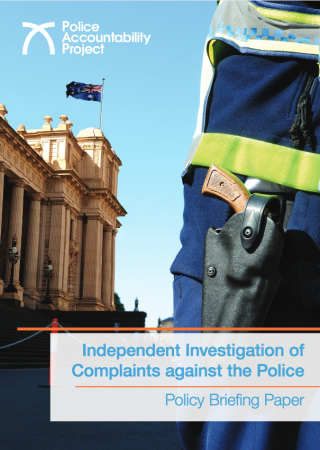This special policy briefing paper is intended for Ministers, Members of Parliament, policy makers, police command and community advocates.
It makes 32 key recommendations and covers six primary issues:
- How complaints against police are currently investigated in Victoria
- What’s wrong with the current system?
- Getting the model right
- Investigation of police-related deaths
- Why the NSW Law Enforcement Conduct Commission is no model for Victoria.
- Overcoming the perceived barriers to independent investigation
Download the Policy Briefing Paper 2017_online (PDF).
Hard copies are available upon request.
This new, updated and extended policy briefing paper addresses the persistent and reoccurring issues which have plagued Victoria’s system of police oversight. It draws upon the direct experience of victims, solicitors from community legal centres and law firms and upon decades of international research and developing best practice approaches.
From the Inroduction
All Victorians are stakeholders in ensuring a robust, effective and human rights oriented police accountability system. In this extended and updated Briefing Paper, we seek to give voice to the experience of many Victorians we have assisted navigate the current police oversight system.
Overwhelmingly, their collective experience is of a system that has failed to respect fundamental human rights.
Police are granted extensive powers by the Victorian Parliament and it is the parliament’s responsibility to ensure that these powers are not abused. Police must be fully accountable for their every action when interacting with citizens
The use of force, or the use of coercive and invasive powers, are a routine part of a police member’s job. Police are provided with weapons including guns, Tasers, OC (pepper) spray and batons. Police arrest, detain, stop, question and search people, their cars and homes, all of which impacts on fundamental human rights and freedoms.
The abuse of force or power has a profound and detrimental impact on all those who experience it, their families and entire communities. It undermines safety, self-worth and belonging and it erodes faith in the institutions of democracy and the rule of law. Even minor excesses by Police can have a significant impact on the community.
The abuse of police power impacts most upon the already vulnerable such as the young, the mentally ill, those from refugee and migrant backgrounds and Indigenous Australians.
Police who abuse the trust of Victorians must be held accountable. Existing accountability mechanisms in Victoria consistently fail to maintain accountability, uphold human rights, change police behaviour or improve practices.
“In a democracy, policing, in order to be effective must be based on consent across the community…[where the] community recognises the legitimacy of the policing task, confers authority on police personnel carrying out their role in police and actively support them. Consent is not unconditional, but depends on proper accountability.”[1]
Nowhere is this need for accountability more acute than in contexts where the State takes life through the use of deadly force or as result of serious dereliction of duty.
People who, in good faith, lodge a formal complaint about something that they suffered often do so with a sense of injustice. They are often motivated by an impulse that says that “if I don’t complain, what happened to me could happen to someone else.”
The current system tends to punish and dismiss complainants.
Complaints are an opportunity for positive reform. Most people who spend the time and effort it takes to make a formal complaint provide a benefit to the community. Complaints from the public allow the detection, investigation, disciplining and prosecuting of police members who have engaged in misconduct. When a person takes the time and effort to lodge a formal complaint, they create an opportunity for the reform of systemic failures in police practices.
An ineffective police complaint system has the effect of hiding or ignoring human rights abuses against members of the Victorian community. Victorian Parliament has a particular responsibility to ensure the effective and impartial investigation of complaints against police.
Download the Policy Briefing Paper here (PDF).
[1] A New Beginning: Policing in Northern Ireland, The Report of the Independent Commission on Policing for Northern Ireland (Independent Commission for Policing in Northern Ireland, 1999, p22), available at: http://cain.ulst.ac.uk/issues/police/patten/patten99.pdf
[2] Documented accounts of this ‘leaking’ occurring include Operation Styx.




